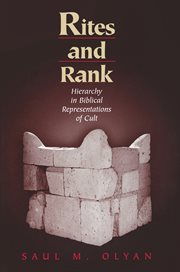Nonfiction
eBook
Details
PUBLISHED
Made available through hoopla
DESCRIPTION
1 online resource
ISBN/ISSN
LANGUAGE
NOTES
Good and evil, clean and unclean, rich and poor, self and other. The nature and function of such binary oppositions have long intrigued scholars in such fields as philosophy, linguistics, classics, and anthropology. From the opening chapters of Genesis, in which God separates day from night, and Adam and Eve partake of the tree of the knowledge of good and evil, dyadic pairs proliferate throughout the Hebrew Bible. In this groundbreaking work melding critical exegesis and contemporary theory, Saul M. Olyan considers the prevalence of polarities in biblical discourse and expounds their significance for the social and religious institutions of ancient Israel. Extant biblical narrative and legal texts reveal a set of socially constructed and culturally privileged binary oppositions, Olyan argues, which instigate and perpetuate hierarchical social relations in ritual settings such as the sanctuary. Focusing on four binary pairs--holy/common, Israelite/alien, clean/unclean, and whole/blemished--Olyan shows how these privileged oppositions were used to restrict access to cultic spaces, such as the temple or the Passover table. These ritual sites, therefore, became the primary contexts for creating and recreating unequal social relations. Olyan also uncovers a pattern of challenge to the established hierarchies by nonprivileged groups. Converging with contemporary issues of power, marginalization, and privileging, Olyan's painstaking yet lucid study abounds with implications for anthropology, classics, critical theory, and feminist studies
Mode of access: World Wide Web







